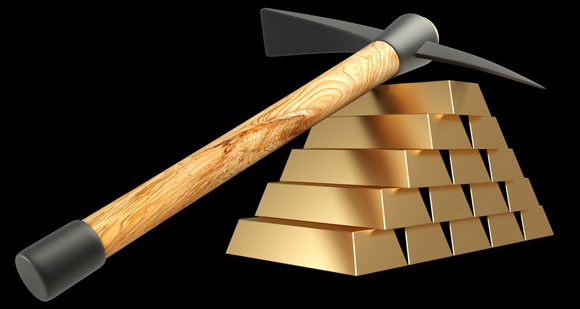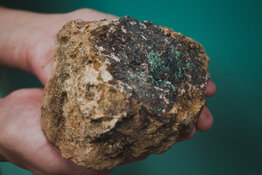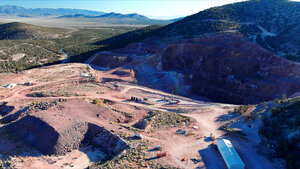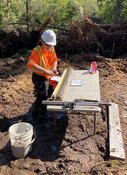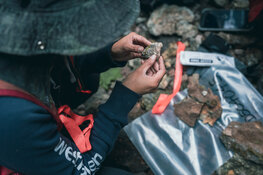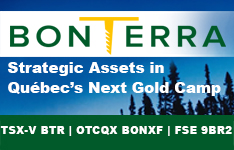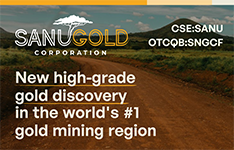The Gold Report: Why haven't the recent Islamic State attacks in Paris spurred a greater safe-haven gold trade? Does it mean the concept of gold as a safe haven is, for the most part, dead?
Ryan Hanley: I don't believe so. Despite the recent attacks, this is the first time in a long time we've seen the United Kingdom backing France, and the U.S. and Russia on the same page. Gold continues to have an inverse relationship with the U.S. dollar, and with the U.S. posting strong employment numbers, we continue to believe that the focus is still on the U.S. dollar and the implications of a rate hike in December.
TGR: What sort of interest rate hike are you modeling?
RH: Our expectation would be about 25 basis points. We believe about 65–70% of that is already priced into the market.
TGR: Where do you peg the low end of the support range for gold in the near term?
"Klondex Mines Ltd. has a good balance sheet, and management continues to execute at its two high-grade assets."
RH: With continued economic strength in the U.S., we expect some near-term pressure to remain on the gold price. We could see it briefly dropping below $1,000/ounce ($1,000/oz) in the near term, but in the long term we're much more bullish, especially given the average all-in sustaining cost of production among the companies we have under coverage is slightly above $1,000/oz. Typically, we've seen seasonal strength in the second half of the year. We could see gold rebound as early as H2/16.
TGR: Your investment thesis roughly consists of low all-in sustaining cost production names in safe jurisdictions with near-term catalysts. Did I miss anything?
RH: That's basically it. I might add that Canadian gold producers continue to benefit from the depreciation of the Canadian dollar versus the U.S. dollar, which has helped a lot. For example, the gold price has gone down by about 10% over the previous year in U.S. dollar terms, but in Canadian dollar terms, once you apply the exchange rate, it's actually up by about 6%.
TGR: At a recent RBC Capital Markets conference in London, a number of companies presenting said they had further room to cut costs. Are the CEOs and management teams in your coverage universe echoing those statements?
RH: For most of the names we cover, there's not significant room for much cost-cutting. We could see slightly lower input costs in terms of mill re-agents, diesel prices, and drilling, so there is a bit of room to boost margins, but not by any significant measure.
TGR: You cover some drilling companies. How much lower are drilling costs now versus five years ago?
RH: I'd say they've come off about 50% on average, but in some cases, it's significantly more. It depends on whether you are in a well-developed camp like Red Lake, Ontario, or Val d'Or, Québec versus northern British Columbia (B.C.), where helicopters are used to deliver drills. In prime mining camps, drill costs are probably 50% lower, if not more. You can get down to about $60 per meter ($60/m) on your base costs, but in some cases that doesn't include geology or fuel. Forage Orbit Garant Inc. (OGD:TSX), for example, drills primarily in Canada, and its average drilling costs are about $90/m, which is toward the low end of the historical average.
"Now that Kirkland Lake has effectively put St Andrew Goldfields Ltd. in play, it might attract a rival bid from other companies."
On the positive side for the drillers, we have seen some signs of stabilization, with the number of meters drilled and price per meter continuing to increase slightly year-over-year for several consecutive quarters.
TGR: AuRico Gold Inc. and Alamos Gold Inc. (AGI:TSX; AGI:NYSE) merged earlier this year as equals. AuRico had assets. Alamos had cash. These types of mergers tend to happen in small- and micro-cap equity names. Are mining mergers and acquisitions (M&A) moving up the food chain?
RH: I think so. These tend to be opportunistic events that have recently focused more on companies generating cash flow. Alamos and AuRico were a good fit because Alamos had permitting delays in its development pipeline, specifically in Turkey, and AuRico had Young-Davidson, a gold asset in northern Ontario that's ramping up on time and that will provide organic growth.
TGR: Is Alamos going to have any long-term permitting issues with either Kirazlı or Ağı Dağı in Turkey?
RH: We've never been overly optimistic on the timing of permitting in Turkey. That being said, we think it will happen. Other gold companies, like Eldorado Gold Corp. (ELD:TSX; EGO:NYSE), have proven they can build and operate mines in Turkey.
TGR: Do you expect other companies under coverage to engage in M&A in 2016?
RH: There may be a couple of other names in our coverage universe where M&A could happen and we expect companies to explore those opportunities throughout 2016. A lot of companies that have production assets in riskier parts of the world could start to target companies with operations in Canada to take advantage of the safer jurisdiction and Canadian gold price.
"We could see gold rebound as early as H2/16."
But the focus is still going to be on cash flow. Investors are typically looking at gold companies generating cash at the current gold price and are not moving down the food chain to exploration projects just yet.
TGR: What are some names you cover that could be involved in M&A?
RH: We see the most likely candidates as producers with good balance sheets that probably want to further diversify. Klondex Mines Ltd. (KDX:TSX; KLDX:NYSE.MKT) would be a good example. The company has performed quite well. It has a strong balance sheet and it might be interested in going after something that would fit its underground gold mining expertise. Another one might be Lake Shore Gold Corp. (LSG:TSX), which has successfully turned around its operations in northern Ontario. The company is building up its balance sheet after several consecutive good quarters. It might want to acquire something bigger than Temex Resources Corp. (TME:TSX.V; TQ1:FSE) by using its slightly higher valuation to its advantage.
TGR: AuRico Metals Inc. (AUQ:TSX; AUQ:NYSE) was spun out of the AuRico-Alamos merger, and you recently launched coverage on it—heady status for a new company. Why did AuRico Metals make the cut?
RH: AuRico Metals caught our attention mostly because the company has a cash flow-generating royalty portfolio. That includes a recently created 1.5% net smelter royalty on Young-Davidson. We expect that to yield about US$4 million (US$4M) in 2016. It's worth pointing out that the last couple of times we've started following junior royalty companies with cash flow-generating royalties, it didn't take long before they got taken out by some bigger players. For example, Premier Royalty Inc., which was spun out of Premier Gold Mines Ltd. (PG:TSX), was taken over by Sandstorm Gold Ltd. (SSL:TSX; SAND:NYSE.MKT) not long after going public. Sandstorm acquired Gold Royalties Corp. about 18 months later.
"Canadian gold producers continue to benefit from the depreciation of the Canadian dollar versus the U.S. dollar."
AuRico Metals also has the advanced-stage Kemess underground copper-gold project in B.C., where there is a substantial amount of infrastructure in place. And most of the management team that was at AuRico Gold is now with AuRico Metals. We typically like to follow good management teams as they transition from one company to another.
TGR: How long before Kemess reaches commercial production?
RH: It's going to take some time. We should see an updated feasibility study in Q1/16. We don't anticipate a construction decision until later in the year. You're probably looking at a late 2018/early 2019 start in a best-case scenario for initial production, at which point Kemess is expected to move through a five-year precommercial production period related to initial underground development given that it will be a block caving operation.
TGR: What are some gold companies you cover with near-term catalysts?
RH: We like Teranga Gold Corp. (TGZ:TSX; TGZ:ASX). We think it has underperformed lately due to a market focus on Canadian producers that benefit from the Canadian dollar gold price. Teranga operates the Sabodala gold mine in Senegal, and it started mining the Gora satellite pit in Q4/15. The average reserve grade at Gora is north of 4.7 grams per ton (4.7 g/t), and that high-grade material should help Teranga generate significantly greater cash flow. The company is also looking at adding a heap-leach component to its Sabodala gold production. We believe that this has the potential to add about 32,000 ounces a year (32 Koz/year) by late 2018.
A little-followed name with near-term catalysts is Avnel Gold Mining Ltd. (AVK:TSX), which has an 80% interest in the Kalana gold project in southern Mali. The company should release a definitive feasibility study in Q1/16 that will build upon a preliminary economic assessment (PEA) that it released in early 2014. The resource is about 2.8 million ounces (2.8 Moz) in the Measured and Indicated category at an average diluted grade of about 2.85 g/t, which is actually quite good for an open pit. Given the high-grade nature of the deposit, it should have an internal rate of return close to 50% at a gold price of $1,100/oz, which is quite impressive.
TGR: Turnaround stories have garnered the most attention this year. What are those likely to be in 2016?
RH: In terms of turnaround stories, I'd probably go back to the Canadian market and Primero Mining Corp. (P:TSX; PPP:NYSE). It is trading at a steep discount—roughly 0.4 times net asset value (NAV) as it continues to have underground throughput issues at Black Fox. Primero acquired Black Fox through the purchase of Brigus Gold Corp. in March 2014. Since then its focus has been transitioning the mine from an open pit to an underground operation, with the goal of processing 1,000 tonnes per day (1 Ktpd). That's taken longer than expected. In 2016 the company will be going after the Deep Central zone, which should get it to a sustainable 1 Ktpd by Q2/16. The deposit also tends to get better grades at depth, so grades should be moving from about 5–6 g/t at the 560m level underground to about 8–9 g/t once it reaches the Deep Central zone later in 2016.
"With continued economic strength in the U.S., we expect some near-term pressure to remain on the gold price."
Another one is St Andrew Goldfields Ltd. (SAS:TSX). We've taken a closer look at it following the announcement of the Kirkland Lake Gold Inc. (KGI:TSX) takeover bid. I've long believed St Andrew is undervalued, although it is worth noting that the Abramson family owns 50%, which limits liquidity.
St Andrew operates the Holt and Holloway mines and those assets continue to perform well. It also started up the Taylor mine in Q4/15, on time and on budget. Now that Kirkland Lake has effectively put St Andrew in play, it might attract a rival bid from other companies in the camp, like Lake Shore Gold, Primero or Richmont Mines Inc. (RIC:TSX; RIC:NYSE.MKT).
TGR: Please fill our readers in on the Kirkland Lake offer.
RH: It's a friendly, all-share deal consisting of 0.0906 Kirkland Lake shares for each St Andrew share. Kirkland Lake is trying to combine these assets to create an Ontario gold producer with production of about 260–310 Koz/year at cash costs of $600–690/oz. But again, the focus is on taking advantage of that Canadian dollar gold price.
TGR: Holt and Holloway are older assets. Is there anything else in the pipeline?
RH: St Andrew has a sizable exploration package. There are lots of targets for it to explore on its own property. We thought St Andrew would acquire other assets, not be acquired. Our belief is that the majority shareholder is interested in the Kirkland Lake deal, but if somebody else happened to make a sweeter bid, the company could be sold to another acquirer.
TGR: What are your top picks for 2016?
RH: Avnel would be probably our top pick in the development space. Primero would be our top in the intermediate space. Our two favorites in the junior space are Wesdome Gold Mines Ltd. (WDO:TSX) and Klondex.
"Gold continues to have an inverse relationship with the U.S. dollar."
We've followed Wesdome for some time. It has the Eagle River underground and the Mishi open-pit gold mines in northern Ontario. The company recently discovered two new parallel zones at Eagle River, labeled the 300 and 7 zones. Those zones could significantly extend the Eagle River mine life. The current reserve grade is about 10 g/t. Wesdome started mining the 300 zone in Q3/15, so we'll see how those grades hold up. We expect good things in 2016.
Klondex has always been a favorite. We've visited Midas and Fire Creek in Nevada several times over the last five years. Klondex has a good balance sheet, and management continues to execute at its two high-grade assets, which continue to generate free cash flow.
But the key for the Klondex story is what it's going to go after next. We expect it to look at assets in North America, especially high-grade underground gold projects because that's where the company can leverage its expertise.
TGR: What would be some possible targets?
RH: Maybe Wesdome. With Wesdome you have a 10 g/t underground mine that's working well, and the potential for a lot more. At this point, it's just about getting a better handle on the grades. I think Klondex and Wesdome would probably be the most logical fit.
TGR: Wesdome has fairly high operating costs. Do you have sufficient confidence that management can bring those down?
RH: We do. Wesdome has a bit of a legacy issue in that previous management did not spend money developing its assets. Eagle River has been in production for over 25 years, but with two to three years mine life at a time. CEO Rolly Uloth joined Wesdome a little over a year ago and started to spend money on underground development, as well as expand the management team. We're expecting that work to push cash costs down from about $900/oz to sub-$800/oz next year. It is also looking at doing a mill expansion.
TGR: Klondex has about $40M in debt. Is that a problem?
RH: I don't think so. The balance sheet is still quite strong and the company is generating free cash flow. Basically, it raised money to buy the Midas mill by setting up a gold purchase agreement with Franco-Nevada Corp. (FNV:TSX; FNV:NYSE). The only significant debt it has is the Franco gold stream.
TGR: Will 2016 be the year when this sector finally begins its climb out of the doldrums, or will investors have to wait until 2017 or beyond?
RH: I'm hoping things start to turn around in 2016. We've seen a lot of cost-cutting, especially among the senior producers. A few years ago, Barrick Gold Corp. (ABX:TSX; ABX:NYSE), one of the world's largest gold producers, was spending billions, and was billions more in debt. But with all its asset divestitures and cost-cutting, it's now a totally different story.
Across the space everyone is looking through a magnifying glass at ways to improve balance sheets. Now we need some cooperation from the gold price. Our belief is that toward the end of 2016, we're going to see something of a rebound. But it's really going to come down to the gold price, which is why the companies we selected as our top picks are fit to weather the storm. Should depressed commodity prices continue for a while, they will still be the ones generating cash flow.
TGR: Thank you for your insights, Ryan.
Ryan Hanley is a Toronto-based mining analyst with Mackie Research Capital. He has covered producers and late-stage developers in the gold sector, as well as mineral drillers, for the past four years, after having previously worked as a mining research associate and investment banking analyst. Hanley holds a bachelor's degree from McMaster University, and is currently pursuing the CFA designation.
Read what other experts are saying about:
Want to read more Gold Report interviews like this? Sign up for our free e-newsletter, and you'll learn when new articles have been published. To see a list of recent interviews with industry analysts and commentators, visit our Streetwise Interviews page.
DISCLOSURE:
1) Brian Sylvester conducted this interview for Streetwise Reports LLC, publisher of The Gold Report, The Energy Report and The Life Sciences Report, and provides services to Streetwise Reports as an independent contractor. He owns, or his family owns, shares of the following companies mentioned in this interview: None.
2) The following companies mentioned in the interview are sponsors of Streetwise Reports: Klondex Mines Ltd. and St Andrew Goldfields Ltd. Franco-Nevada Corp. is not affiliated with Streetwise Reports. The companies mentioned in this interview were not involved in any aspect of the interview preparation or post-interview editing so the expert could speak independently about the sector. Streetwise Reports does not accept stock in exchange for its services.
3) Ryan Hanley: I own, or my family owns, shares of the following companies mentioned in this interview: None. I personally am, or my family is, paid by the following companies mentioned in this interview: None. My company has a financial relationship with the following companies mentioned in this interview: Klondex Mines Ltd. I was not paid by Streetwise Reports for participating in this interview. Comments and opinions expressed are my own comments and opinions. I determined and had final say over which companies would be included in the interview based on my research, understanding of the sector and interview theme. I had the opportunity to review the interview for accuracy as of the date of the interview and am responsible for the content of the interview.
4) Interviews are edited for clarity. Streetwise Reports does not make editorial comments or change experts' statements without their consent.
5) The interview does not constitute investment advice. Each reader is encouraged to consult with his or her individual financial professional and any action a reader takes as a result of information presented here is his or her own responsibility. By opening this page, each reader accepts and agrees to Streetwise Reports' terms of use and full legal disclaimer.
6) From time to time, Streetwise Reports LLC and its directors, officers, employees or members of their families, as well as persons interviewed for articles and interviews on the site, may have a long or short position in securities mentioned. Directors, officers, employees or members of their families are prohibited from making purchases and/or sales of those securities in the open market or otherwise during the up-to-four-week interval from the time of the interview until after it publishes.



